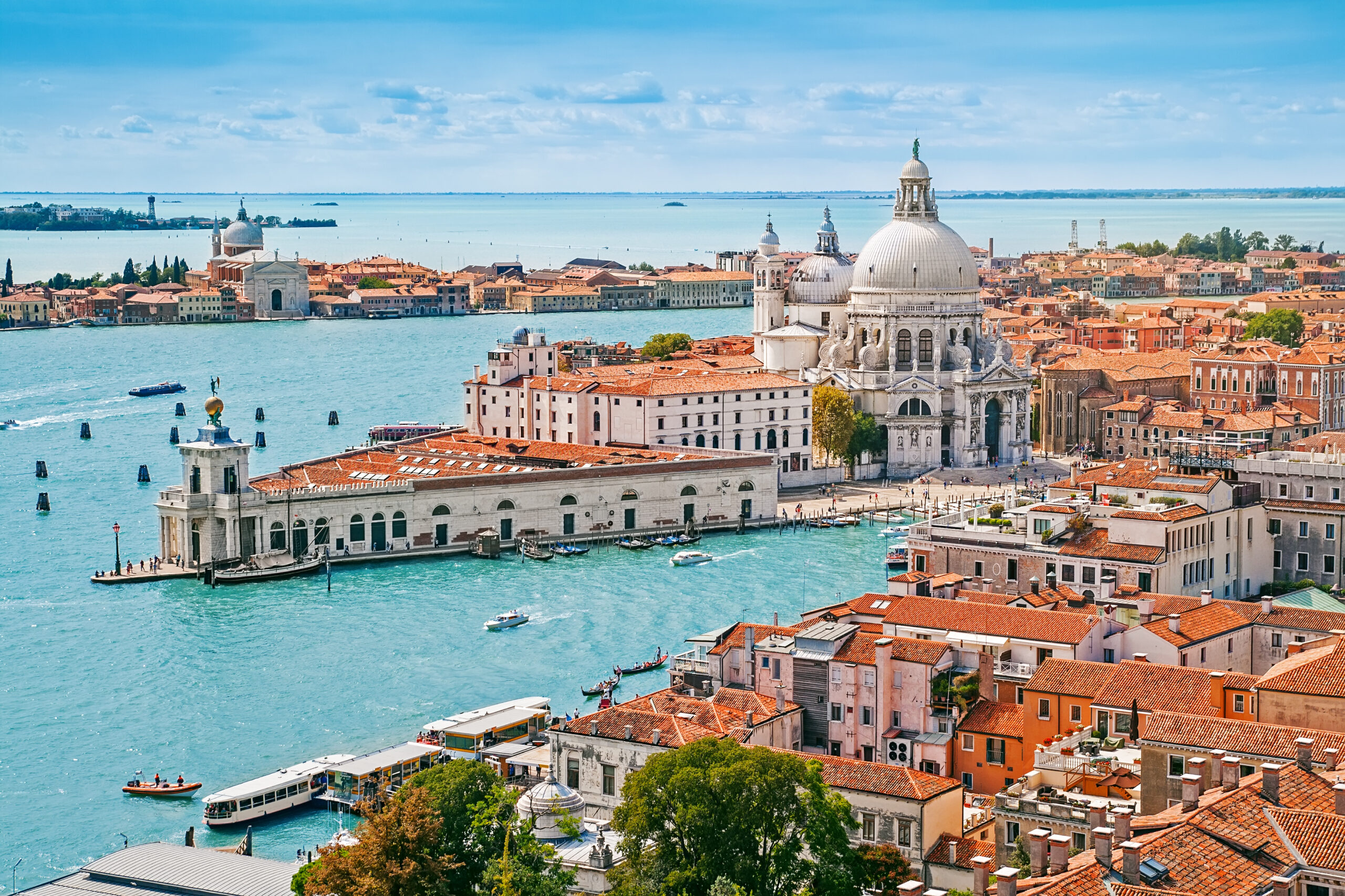- Venice is a set of 118 islands separated by canals and connected by over 400 bridges.
- St. Mark’s Square is one of the most culturally relevant squares in the world.
- At more than three centuries old, the world’s oldest coffeehouse is in Venice.
Made up of 118 islands and recognized as a UNESCO World Heritage site, Venice draws thousands of tourists each year due to its wholly unique geography where winding streets give way to bridges over countless canals. Without a doubt, this Italian city has earned its reputation for romanticism. But Venice has so much more to offer than candlelit dinners and gondola rides, which you’ll discover below.
Go on a Venice Adventure
If you’re visiting Venice for the first time, you might be tempted to visit one of the hundreds of tourist attractions in the most unique city in the world. Try this option instead: Check your bags into the hotel and head out the door.
Venice is a city with countless attractions. While you can plan to visit the significant locations (such as the ones listed here), there is much more to discover if you hit the cobblestone walkways and begin an adventure.
A word of caution, however: Venice is small as far as cities are concerned, but waterways and canals honeycomb the city, and the roads and alleyways aren’t much better. Go on an adventure, but bring a GPS or a map with you.
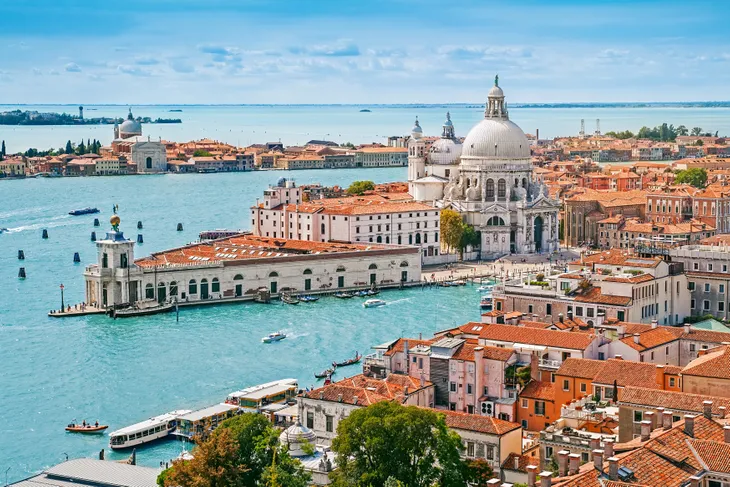 Shutterstock/Pani Garmyder
Shutterstock/Pani GarmyderCross the Grand Canal
If you took your first steps and started your Venice adventure, it won’t take long before you end up at a canal. If that canal is the Grand Canal, then congratulations, you’ve encountered your first big attraction.
The Grand Canal curves through Venice, providing a means of public transportation, freight and supply transport through the city. It also makes a great tour route. If you’re still in adventure mode, you have a few options.
Gondolas are fun and novel but expensive. There are also taxi boats, but these are best if you’re with a group. The cheapest options are the ferries, known as Traghetto and the Vaporetto, which you could call a water bus.
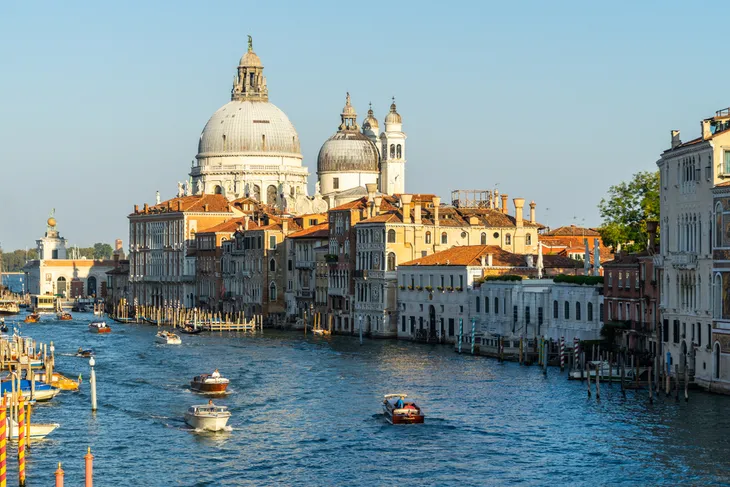 Shutterstock/Francesco Bonino
Shutterstock/Francesco BoninoVisit Piazza San Marco, Also Known as St. Mark’s Square
As the primary public square of Venice, Piazza San Marco is one of the most charming places in Europe. It’s where you’ll find some of the most important historic buildings in the city, including the Palazzo Ducale, the San Marco Campanile and, of course, the monumental Basilica di San Marco.
Another can’t-miss historic building in the square is the Torre dell’Orologio. Known as The Clock Tower in English, the early Renaissance structure has stood since the 15th century.
There are far too many attractions in St. Mark’s Square to list here, so it’s best to arrive early, keep your itinerary open and be prepared to explore.
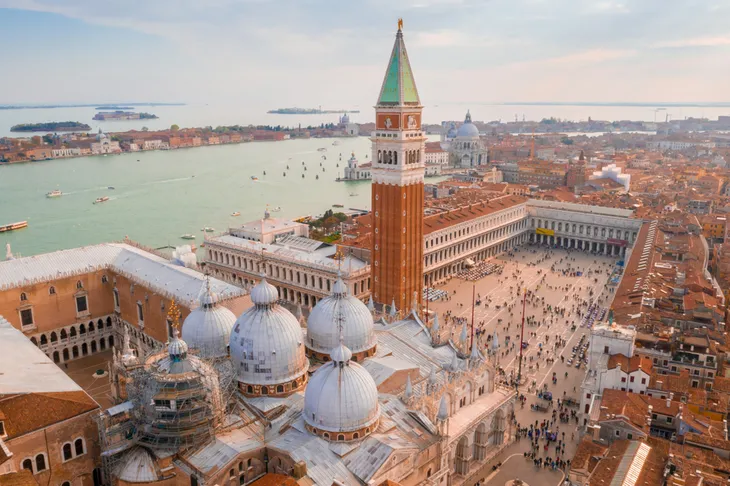 Shutterstock/Ingus Kruklitis
Shutterstock/Ingus KruklitisExplore the Monumental Beauty of the Basilica di San Marco
While in St. Mark’s Square, be sure to experience the Basilica di San Marco. A monumental cathedral consecrated in 1094, Basilica di San Marco was built to replace the previous cathedral, San Pietro di Castello. It now houses Saint Mark’s relics.
The Basilica di San Marco represents a rich tapestry of culture, architecture and art. The foundation is a Greek cross design, but Byzantine, Roman and Islamic architectural influences are apparent. While the cathedral was more modest centuries ago, throughout the ages, precious stones and rare marbles were added to its façade. The interior is enchanting, with elaborate golden mosaics adorning the domes and vaults.
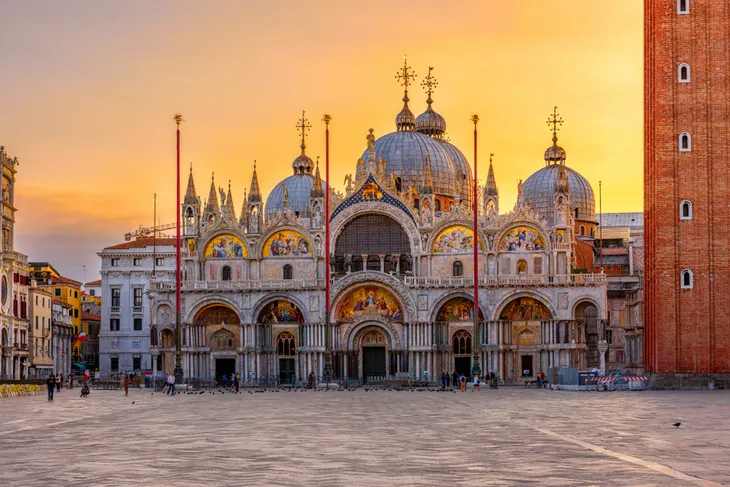 Shutterstock/Catarina Belova
Shutterstock/Catarina BelovaTake in the View from St. Mark’s Campanile
Venice is famous for its numerous bell towers, known as campaniles to the locals. None are as noteworthy as St. Mark’s Campanile. Impossible to miss its imposing presence near the Grand Canal, St. Mark’s Campanile stands 98.6 meters tall, making it the best place to bask in a unique panorama of Venice.
St. Mark’s Campanile has a complicated structural history. Resting on Roman foundations built in the 9th century, the tower began construction in the 12th century but underwent numerous rebuilds through the early 16th century. Then, in 1902, the tower collapsed but was rebuilt a decade later.
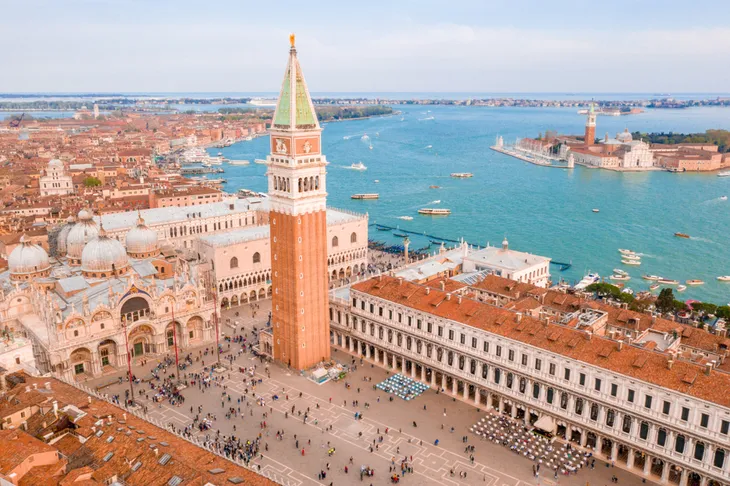 Shutterstock/Ingus Kruklitis
Shutterstock/Ingus KruklitisExperience the Oldest Café In the World
Sitting beneath the arcades of the Procuratie Nuove overlooking Piazza San Marco is a historic landmark known as Caffé Florian. Opened on December 29, 1720, it’s the world’s oldest coffeehouse.
However, if you’re looking for a quick cup of coffee, this isn’t the place. Caffé Florian is a monument to Venice’s rich history — the brand even claims its status as a symbol of Venice. As such, dining at Caffé Florian is as much about the experience as it is about the food.
When you seat yourself at one of Florian’s bistro tables that overlook the square, kindly waiters in starched white bring you delicacies on polished silver platters while you steep yourself in centuries of history.
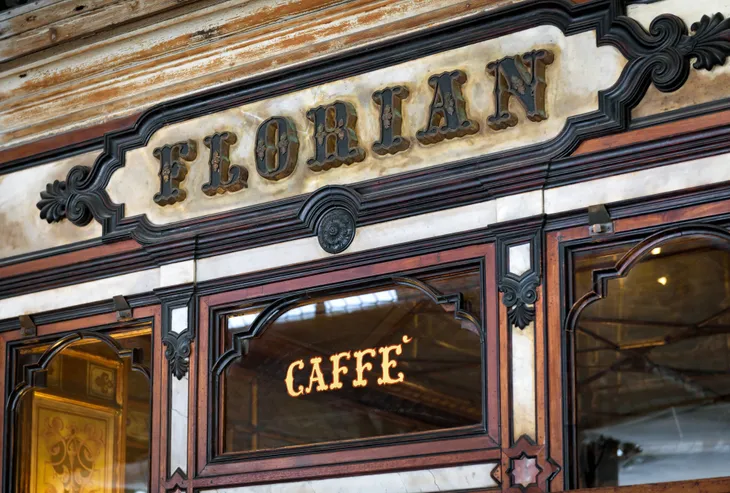 Shutterstock/Viacheslav Lopatin
Shutterstock/Viacheslav LopatinDiscover the Secret Itinerary of Palazzo Ducale
The Doge’s Palace, known as Palazzo Ducale to the locals, is an elaborate palace built in Venetian Gothic style. It served as the residence of the Doge of Venice, the elected leader of the Republic of Venice.
The Doge’s Palace remains an important landmark and museum where visitors can learn more about Venice’s rich history as a city and an independent republic that existed for more than a millennia.
For a deep dive into Venice’s history, book a guided tour on the Secret Itinerary, where you’ll browse the palace’s offices, courtyards, secret passages and interrogation rooms, including access to the interior of the Ponte dei Sospiri.
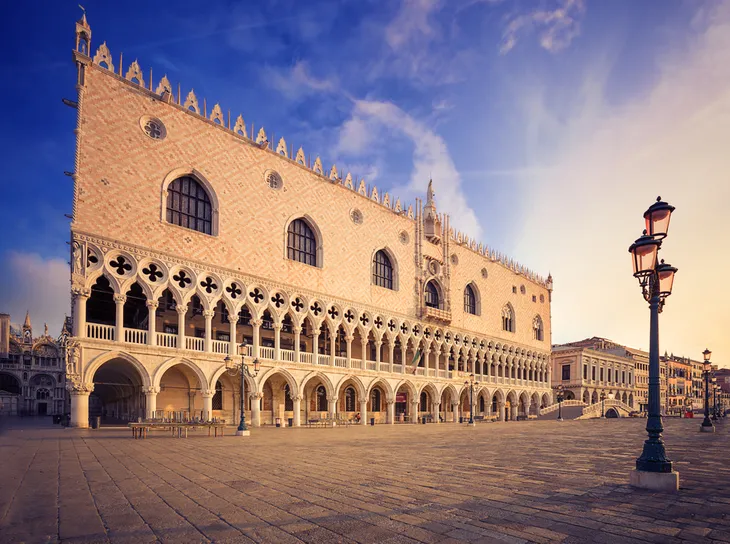 Shutterstock/Phant
Shutterstock/PhantDiscover the History Behind the Ponte dei Sospiri
There’s no shortage of bridges in Venice, though the most infamous one is Ponte dei Sospiri. Built in the 17th century when Venice was still a republic, the bridge passes from the interrogation rooms in the Doge’s Palace, over the Rio di Palazzo and into the prison.
To serve its purpose as a prisoner passage, the bridge is an enclosure with only a few square windows barred with stone. It presumably earned its name due to the prisoner’s sighs of despair at their last glimpse of the sea and sky.
Its purpose long since retired, and visitors can see the bridge on a gondola ride or from the Paglia and Canonica bridges. To visit the interior, the city requires a guided tour of Palazzo Ducale.
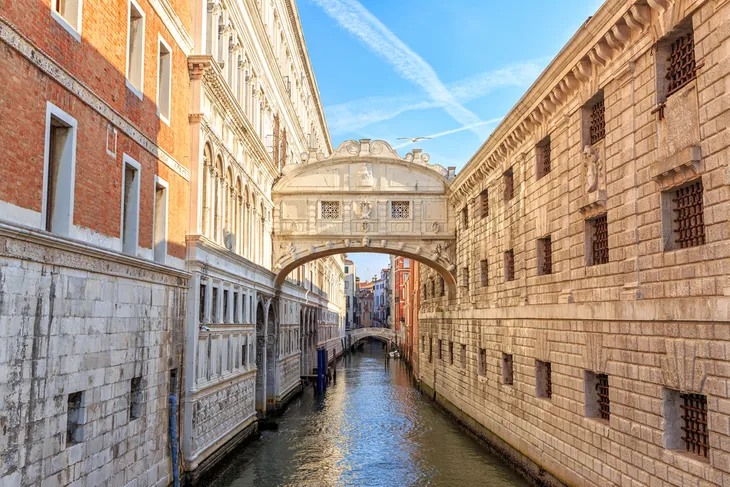 Shutterstock/Maykova Galina
Shutterstock/Maykova GalinaSpend an Afternoon at Riva degli Schiavoni
Located on the edge of the Grand Canal, Riva degli Schiavoni is a large promenade with countless tourist attractions, though plenty of locals also frequent it. There are dozens of bars, cafés, restaurants and hotels that start at the height of the Palazzo Ducale and stretch to the Biennale gardens.
The boardwalk is also popular in the late afternoons, thanks to Venice’s beautiful sunsets. It’s also a great spot for locating souvenir vendors or flagging down a gondolier.
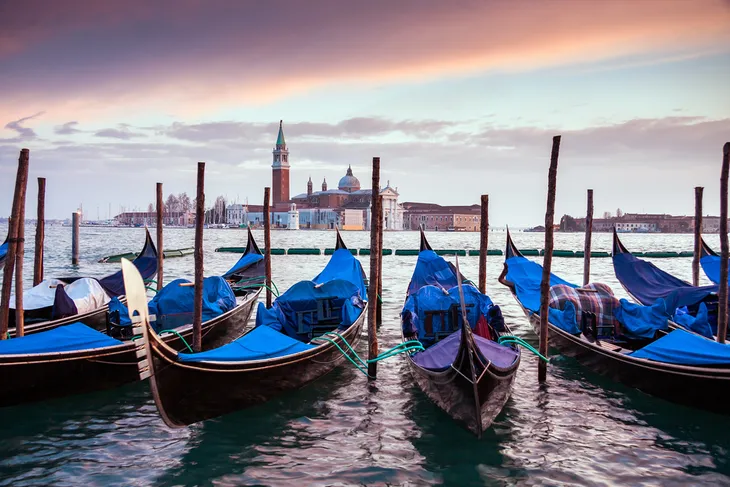 Shutterstock/duchy
Shutterstock/duchyBask in Colorful Cannaregio and Burano
If you want to get away from the traditional itineraries of Venice, there are a couple of colorful locales you can visit to change things up.
The first spot is the island of Burano, a fishing district that maintains a tradition of homes painted in vibrant colors. One could describe Burano as quaint and charming, possibly since there are fewer tourists in the area.
The second area is Cannaregio, a lively district known as the first Jewish ghetto. However, a lot’s changed since the 16th century, and these days, the backstreets are great for crafts, thrift shops and vintage goods. Like Burano, Canneregio residents prefer vivid paint jobs on their houses.
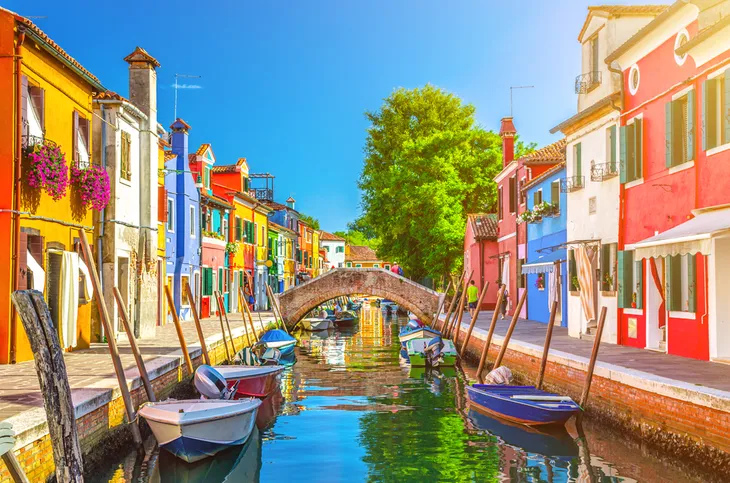 Shutterstock/Aliaksandr Antanovich
Shutterstock/Aliaksandr AntanovichLearn How Murano Glass Is Made
The island of Murano is world-renowned for its beautiful works of glass, a centuries-old art in the region. To this day, tourists visit Murano to learn about its glass.
In the city proper, you can tour several factories and learn how they produce the glass, but you’ll have to get there early. The afternoons are dedicated to glass exhibitions. When you finish the tour, pay a visit to the Basilica of Santa Maria e Donato and the Glass Museum.
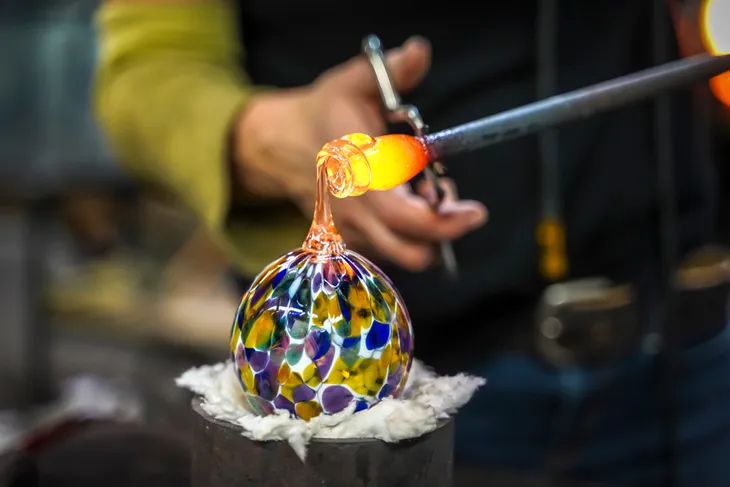 Shutterstock/Stefan Malloch
Shutterstock/Stefan MallochEnjoy the View from Ponte di Rialto
The oldest bridge spanning the Grand Canal, Ponte di Rialto, is Venice’s most famous bridge. Its popularity is partly because it connects the San Marco and San Polo districts. But it’s also a popular tourist attraction, thanks to its impressive architecture.
Ponte di Rialto is an excellent spot to relax, enjoy the sights and sounds of the city and watch the comings, goings and happenings of Venice. It’s also an unbelievable spot to watch the sunrise. If you’re concluding your visit to Venice and catching a morning flight out, a sunrise rendezvous at Ponte di Rialto might be the perfect ending to your adventure.
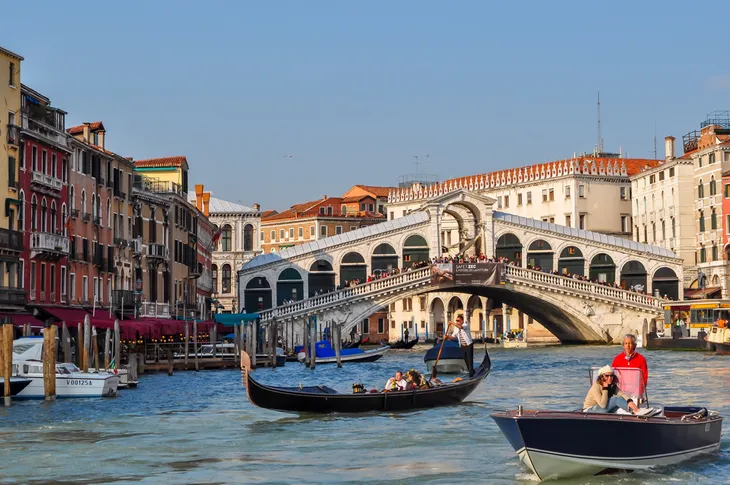 Shutterstock/Mistervlad
Shutterstock/Mistervlad